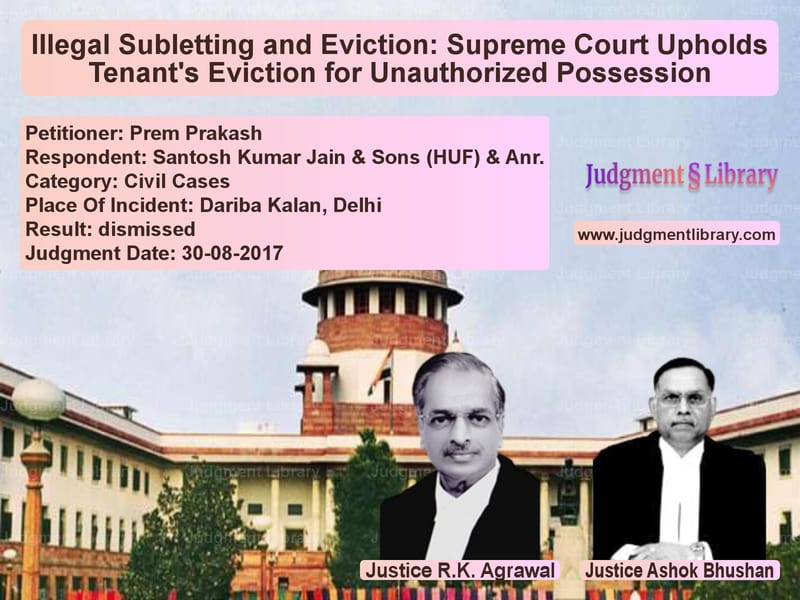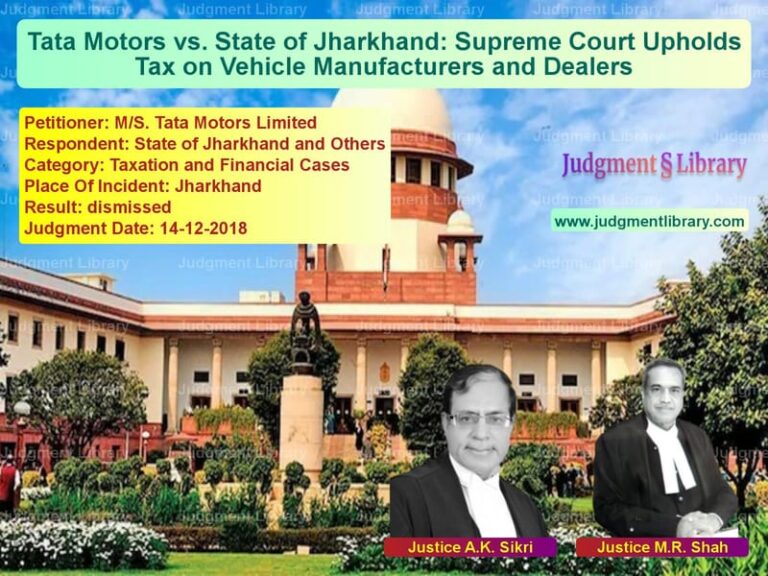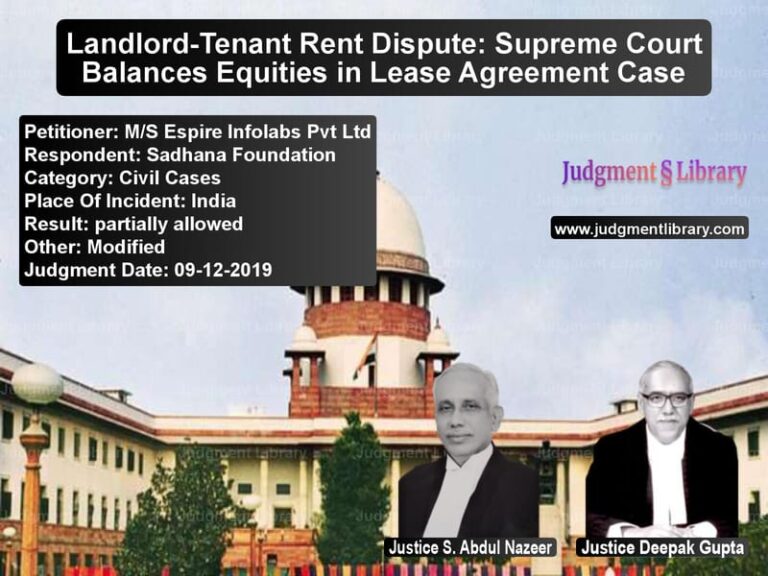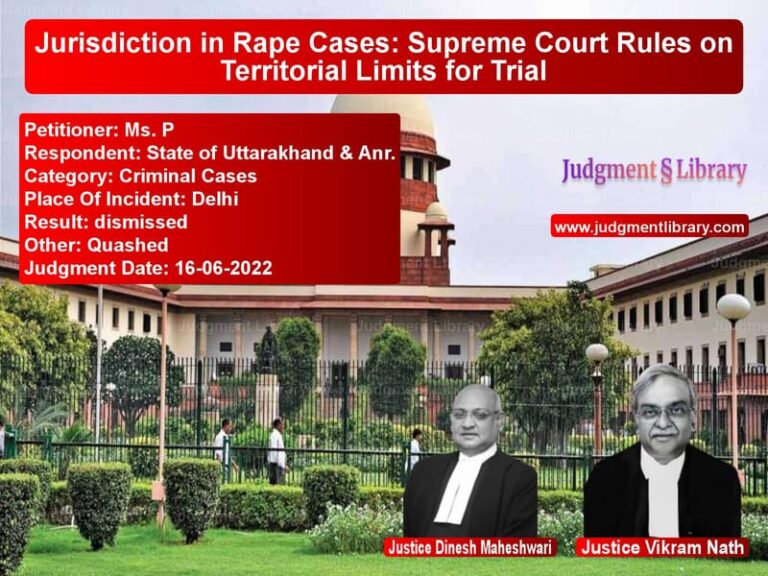Illegal Subletting and Eviction: Supreme Court Upholds Tenant’s Eviction for Unauthorized Possession
The Supreme Court of India, in Prem Prakash v. Santosh Kumar Jain & Sons (HUF) & Anr., delivered a crucial judgment regarding unauthorized subletting under the Delhi Rent Control Act, 1958. The case revolved around the eviction of a tenant who was found to have sublet the premises without the landlord’s consent.
The ruling reaffirmed the principle that tenants cannot unilaterally transfer possession of rented premises to third parties without the express consent of the landlord. The Court upheld the Delhi High Court’s order of eviction, setting aside previous orders that had favored the tenant.
Background of the Case
The dispute originated when the respondent, Santosh Kumar Jain & Sons (HUF), the owner of a commercial shop located at Shop No. 16 (Private No. 15), Gali Kunjas, Ward No. IV, Dariba Kalan, Delhi, filed an eviction petition against the tenant, Prem Prakash. The eviction was sought under Sections 14(1)(a) and 14(1)(b) of the Delhi Rent Control Act, 1958, on the following grounds:
- The tenant was in arrears of rent from January 1, 2002.
- The tenant had sublet the premises without prior consent to a third party (Respondent No. 2).
The Additional Rent Controller, North Delhi, dismissed the eviction petition on September 8, 2011, stating that the landlord had failed to establish illegal subletting. The landlord appealed before the Rent Control Tribunal, Delhi, which also upheld the earlier decision on March 24, 2014.
Dissatisfied with the rulings, the landlord approached the Delhi High Court, which, on November 7, 2014, reversed the lower courts’ findings and ordered the tenant’s eviction. The tenant then approached the Supreme Court through a Special Leave Petition.
Arguments by the Petitioner (Tenant – Prem Prakash)
The tenant, through his counsel, argued:
- Respondent No. 2 was not a subtenant but an employee who was merely assisting with the business.
- The tenant had never transferred possession of the shop.
- Respondent No. 2 was working on a commission basis and did not have any legal right over the premises.
- The shop continued to be in the tenant’s legal and physical possession, and therefore, the eviction order was unjust.
Arguments by the Respondent (Landlord – Santosh Kumar Jain & Sons)
The landlord, who appeared in person, countered these claims:
- The tenant had completely transferred possession of the shop to Respondent No. 2, who was running a separate business from the premises.
- The alleged subtenant had even put up a signboard of his own business, “M/s R.R. Jewellers,” at the premises.
- Business cards and advertisements showed Respondent No. 2 as the sole proprietor of the shop, further proving illegal subletting.
- The tenant failed to produce any salary records or documentary evidence proving that Respondent No. 2 was an employee.
Supreme Court’s Observations
The Supreme Court bench, comprising Justice R.K. Agrawal and Justice Ashok Bhushan, analyzed the case and made the following key observations:
“Once the landlord establishes that a third party is in exclusive possession of the premises, the burden shifts to the tenant to prove that the possession is lawful and not in violation of the tenancy agreement.”
The Court cited precedent cases that emphasized the tenant’s responsibility in proving that there was no unauthorized subletting:
- Associated Hotels of India Ltd. v. Sardar Ranjit Singh (1968) – Established that the burden to prove subletting is initially on the landlord, but if possession is proven, the tenant must justify the presence of the third party.
- Vaishakhi Ram v. Sanjeev Kumar Bhatiani (2008) – Held that once the landlord demonstrates subtenant possession, the onus shifts to the tenant to disprove unlawful subletting.
Applying these principles, the Supreme Court held that the tenant failed to discharge his burden. The presence of independent business signboards, business cards, and tax records showing the subtenant’s business indicated exclusive possession, confirming unauthorized subletting.
Supreme Court’s Ruling
The Supreme Court upheld the Delhi High Court’s decision and ordered:
- Eviction of the tenant Prem Prakash from the property.
- Dismissal of the tenant’s appeal.
- Restoration of possession to the landlord.
The Court ruled:
“The evidence overwhelmingly establishes that the tenant had unauthorizedly parted with possession of the premises in favor of a third party, warranting eviction under Section 14(1)(b) of the Delhi Rent Control Act, 1958.”
Legal Principles Affirmed
This judgment reaffirms several crucial legal principles:
- Subletting Requires Landlord’s Consent: Tenants cannot transfer possession to third parties without explicit permission from the landlord.
- Burden of Proof Shifts: If the landlord establishes a prima facie case of subletting, the tenant must provide conclusive proof that the third party’s presence is legal.
- Commercial Tenancy Regulations: Tenants using commercial properties must strictly adhere to the terms of their lease agreements.
- Eviction in Case of Violation: Unauthorized subletting is a valid ground for eviction under the Delhi Rent Control Act, 1958.
Impact of the Judgment
The ruling has significant implications for landlords and tenants in India:
- Ensures protection of landlords against unauthorized subletting.
- Prevents tenants from circumventing lease agreements.
- Strengthens judicial enforcement of rental laws.
- Reinforces landlords’ rights to reclaim possession if tenancy terms are violated.
Conclusion
The Supreme Court’s ruling in Prem Prakash v. Santosh Kumar Jain & Sons (HUF) & Anr. sets an important precedent for rental disputes in India. By emphasizing the burden of proof on tenants in subletting cases, the judgment strengthens landlords’ ability to enforce lease terms and protects them from unlawful occupation.
This judgment will serve as a guide for future tenancy disputes and underscores the importance of adhering to tenancy agreements, ensuring that properties are used only as per contractual terms.
Don’t miss out on the full details! Download the complete judgment in PDF format below and gain valuable insights instantly!
Download Judgment: Prem Prakash vs Santosh Kumar Jain & Supreme Court of India Judgment Dated 30-08-2017.pdf
Direct Downlaod Judgment: Direct downlaod this Judgment
See all petitions in Property Disputes
See all petitions in Landlord-Tenant Disputes
See all petitions in Contract Disputes
See all petitions in Judgment by R K Agrawal
See all petitions in Judgment by Ashok Bhushan
See all petitions in dismissed
See all petitions in supreme court of India judgments August 2017
See all petitions in 2017 judgments
See all posts in Civil Cases Category
See all allowed petitions in Civil Cases Category
See all Dismissed petitions in Civil Cases Category
See all partially allowed petitions in Civil Cases Category







